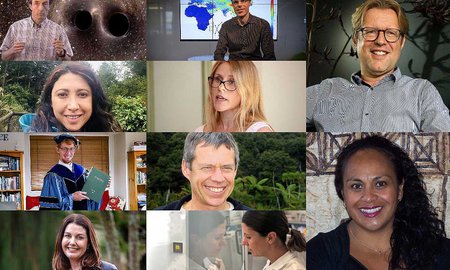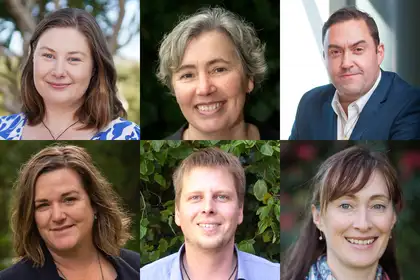
Clockwise from top left: Dr Kealagh Robinson, Professor Mary Morgan-Richards, Professor Jarrod Haar, Dr Aisling Gallagher, Professor Gert Lube and Associate Professor Kelly Dombroski.
Massey researchers have earned one Fast-Start and five Standard Marsden grants for 2024. The awarded projects explore topics across psychology, natural and social sciences, management and environmental studies.
The Marsden Fund, which is awarded annually, provides up to three years of support to researchers with ambitious projects that show novelty, originality and deliver scholarly insights. A highly rigorous selection process with substantial international peer review underpins the world-class standard of successful projects. This year, 113 projects were awarded funding across the motu.
Provost Professor Giselle Byrnes congratulates the research teams who have been successful in this year’s Marsden Fund round.
“These projects address the ‘real world’ problem-solving that Massey University research is known for. They also illustrate the commitments we have made in our research strategy Te Pou Rangahau, such as driving high-quality partnerships and collaborations for excellence and impact, increasing our capability and capacity in securing external research income and advancing excellent cross-disciplinary, interdisciplinary and transdisciplinary research. Huge congratulations to the research teams in securing this highly competitive funding.”
Fast-Start Grant
How caregivers influence the development of emotional dysregulation in young people and the subsequent impact on self-injury – Dr Kealagh Robinson, School of Psychology
Self-harm in adolescents is a growing problem thought to be related to difficulties in regulating emotion. This project examines how young people’s beliefs about emotions are linked to how they regulate them. The research team will engage with secondary students and their whānau to discover those linkages and explore personal empowerment (the ability to take control of your own life). The insights from this research will be invaluable for improving interventions and support for vulnerable young people.
Associate Investigators: Ellie Rukuwai from Victoria University of Wellington and Professor Sheila Crowell from the University of Oregon.
Standard Grants
Determining whether three NZ alpine insects species freeze solid to survive the cold because they share the same gut microbes – Professor Mary Morgan-Richards, School of Food Technology and Natural Sciences
Aotearoa New Zealand’s native insects have an unusual strategy for surviving the coldest alpine environments - they freeze themselves, waiting for warmer temperatures. This project will investigate whether the insects self-create a freezing agent or if their gut microbes might help them to survive the freezing process. Theresults will help us understand how our unique alpine insects survive such extreme conditions.
Associate Investigators: Associate Professor Craig Marshall from the University of Otago and Professor Patrick Biggs and Professor Steven Trewick from Massey University.
He kaupapa whakapakari kaimahi Māori hou: alleviating unique cultural pressures on Māori workers – Professor Jarrod Haar, School of Management
Aronga takirua refers to the fact that many Māori employees perform two roles in their workplaces, their main job and the often-unpaid role of cultural advisor or navigator. This burden is detrimental to Māori workers' wellbeing, productivity and retention across many industries. Professor Haar’s study aims to uncover the underlying causes of Aronga takirua and identify strategies to mitigate its effects. The research findings will benefit Māori employees and employers to better manage the unique cultural work environments in Aotearoa.
Associate Investigators: Dr Benjamin Walker from Victoria University of Wellington, Professor Angus Macfarlane from University of Canterbury and Dr Grace Walker of Think Analytic Ltd.
Reduce, reuse, repair: new kinds of waste-conscious initiatives in circular and postcapitalist economies – Associate Professor Kelly Dombroski, School of People, Environment and Planning
“One person’s trash is someone else’s treasure’’ - but what dictates what we are able to repair and what we throw away? Previously, economic concerns like cost-benefit analysis have dominated this conversation. This research will investigate why and how people reduce, reuse and repair from a social science perspective. It will study people across all walks of life participating in waste-conscious community groups. By focusing on innovation at the community level, new collective strategies to deal with waste may be discovered. These findings can benefit Aotearoa New Zealand and the wider world, as we transition towards a circular economy.
Associate Investigators: Dr Gradon Diprose from Manaaki Whenua Landcare Research and Dr Matthew Scobie from University of Canterbury.
Elucidating why pyroclastic gas and ash flows cause so many volcanic fatalities – Professor Gert Lube, School of Agriculture and Environment
Hot clouds of gas and ash that rush out from volcanoes during explosive eruptions are devastating. They also reach further than we can currently explain, raising questions around what distances are considered safe. This project will measure the interactions between hot volcanic particles and gases in a large simulator chamber. State-of-the-art computational hazard models will then quantify the potential devastation from volcanic eruptions in New Zealand and around the world. This will give us better tools to prepare for one of nature’s most destructive phenomena.
Associate Investigators: Dr Geoff Kilgour from SNS Science, Professor Josef Dufek from University of Oregon, Distinguished Professor Eckart Meiburg from University of California, Santa Barbara, Professor Michael Manga from University of California, Berkeley and Dr Tomaso Esposti Ongaro from the Istituto Nazionale di Geofisica e Vulcanologia, Italy.
Exploring the hidden childcare struggles of parents working in a 24/7 economy – Dr Aisling Gallagher, School of People, Environment and Planning
Roughly one third of New Zealand’s labour force works outside the traditional 9-5 work week. Our childcare facilities currently do not cater for people who don’t fit our traditional work timeframes. So how do families manage their work/care lives in a 24/7 economy? Working with low-income families and communities, this research will investigate the everyday experiences and culturally specific needs of these families, and take account of the role of children and young adults within the household economy. The findings will inform the development of alternative childcare concepts suitable for our 24/7 economy.
Associate Investigators: Dr Mary Breheny from Massey University and Professor Susan Prentice from University of Manitoba.
These six projects each received three-years of funding, totalling $4,852,000.
A number of Massey academics are also involved in research projects led by other institutions. These include:
- Unravelling the mechanisms that create environmental risks in "forever chemicals" (University of Auckland) - Professor Karen Stockin, School of Food Technology and Natural Sciences.
- Imagining honourable kāwanatanga: preparing for a Tiriti-based future (Heather Came and Associates) - Associate Professor Mershen Pillay, Institute of Education.
- Why are tuatara the only known reptile not prone to Salmonella? (Manaaki Whenua Landcare Research) - Professor Brett Gartrell, School of Veterinary Science.
- Testing how the ability to distinguish kin from non-kin affects the evolution of genes, pathogens and species (University of Auckland) - Professor Emeritus Murray Cox, School of Food Technology and Natural Sciences.
- Producing next-generation materials that can capture methane (Victoria University of Wellington) - Professor Shane Telfer, School of Food Technology and Natural Sciences.
Related news
Massey enjoys continued success from Te Pūtea Rangahau a Marsden
Te Pūtea Rangahau a Marsden, the Marsden Fund, have announced funding for seven Massey research projects.
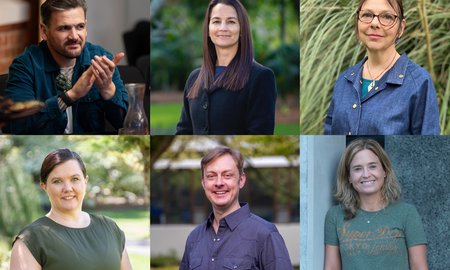
Transgender family support, translating Mātauranga Māori, and viral warfare research among Marsden successes
Te Pūtea Rangahau a Marsden, the Marsden Fund, have announced funding for 13 Massey research projects.
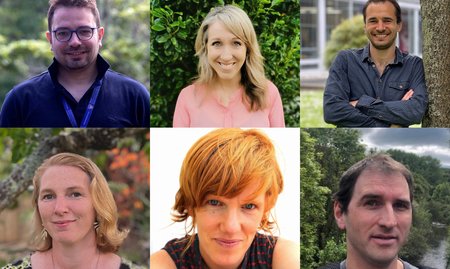
Massey researchers awarded Te Pūtea Rangahau Marsden funding
Te Pūtea Rangahau, the Marsden Fund, have announced funding for 11 Massey projects.
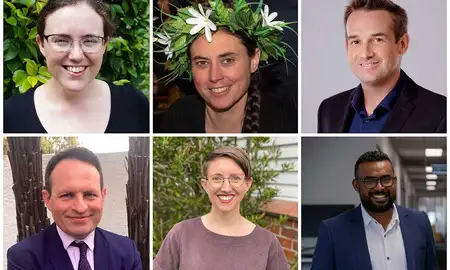
Pandemic, Pasifika health and asthma research among Massey's Marsden successes
Ten Massey University-led research projects will receive almost $9 million from the Royal Society Te Apārangi annual Marsden Fund announced by Research, Science and Innovation Minister Dr Megan Woods.
